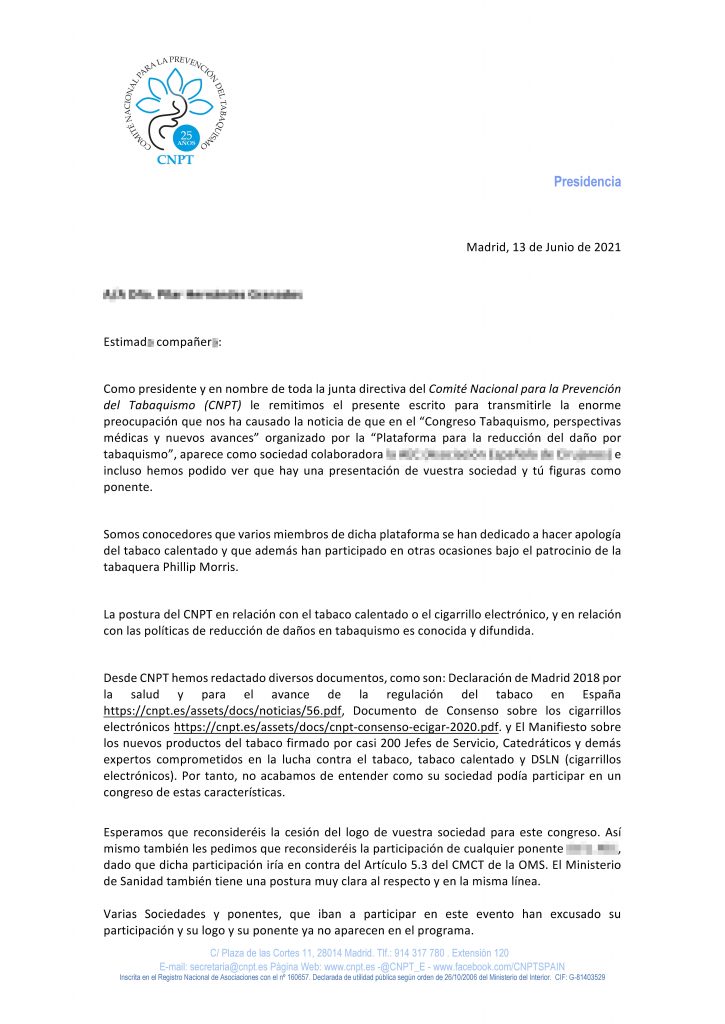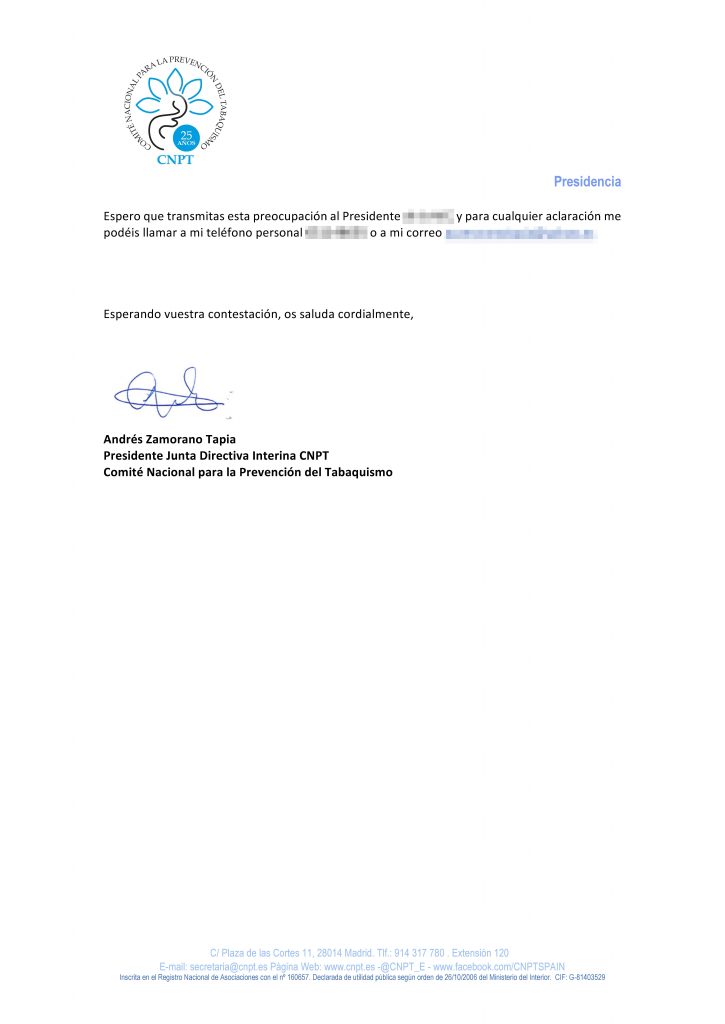The hostility, intransigence, and prodigious mediocrity of Spanish tobacco control make dialogue impossible to favor harm reduction and tobacco cessation.
With mortality higher than COVID-19, every hour about six people die from the consequences of smoking in Spain. The Iberian country, which among adults maintains a prevalence of smoking around 27.9%, has more than half a million ex-smokers who have given up cigarettes thanks to vaping.
In addition, it has a very important and strong business network related to vaping and, according to a study by Consumers Choice Center, the potential lives that could be saved by promoting the change from traditional cigarettes to safer devices for nicotine consumption is more than 2,5 million, from current persons who smoke.
But to become a reality, this scenario requires balanced, skillful, and intelligent public policies, in addition to the consensus that, despite not being innocuous, electronic cigarettes are much safer than smoking. However, the social environment that seems to indicate significant health and economic opportunity for the country clashes scandalously with the intransigent and inflexible stance of major health entities. They are categorically against this possibility and the perspective of harm reduction as public policy.
A new boycott
Rather than dialogue and advancement, some key public institutions on the issue promote boycotts and hostility towards those who advocate for harm reduction and defend the most successful alternatives to smoking in the country.
The case of the congress “Smoking: Perspectives and New Advancements”, organized by Plataforma por la Reducción de Daños por Tabaquismo (Platform for Tobacco Harm Reduction), a platform made up of a group of Spanish doctors, scientists, and health workers, and which supposed to have the collaboration of up to five Medical Societies of national prestige, is one more example.
The Spanish Society of Directors of Primary Care, the Spanish Association of Surgeons, and the Spanish Society of Thoracic Surgery were intimidated by the Ministry of Health not to participate in the event. The Spanish Society of Internal Medicine and the Spanish Society of Oral Surgery, members of the National Committee for the Prevention of Smoking (CNPT), were authoritatively and explicitly threatened by email and phone calls not to participate in the congress.
“Throughout the weekend prior to the congress, we have been informed that both the National Committee for the Prevention of Smoking and the Ministry of Health, in letters signed by Andrés Zamorano [President of the CNPT] and Pilar Campos [Deputy Director-General of Health], have urged these Societies to leave the congress, arguing that the Platform makes an apology for Heated Tobacco (which is scientifically endorsed by both the FDA and by different reports from the UK Ministry of Health, for example), under an assumption, and absolutely false sponsorship of Phillip Morris, as well as the strict opposition of the CNPT and the Ministry against electronic cigarettes, heated tobacco and tobacco, is made clear“, Dr. Carmen Escrig, Ph.D. in Cell Biology and Genetics from the Autonomous University of Madrid and founder of the Platform told to The Vaping Today.

“Given the information received in XXXXXX both by CNPT (National Committee for the Prevention of Smoking), and by the Ministry of Health itself, through its Deputy Director-General, Mrs. Pilar Campos Esteban, on the use of products related to tobacco, through devices capable of releasing nicotine (DSLN) and heated tobacco products, information that our society has received yesterday, we immediately request to withdraw, both from the Congress organized by you for Monday, June 14, as well as from the Platform for Tobacco Harm Reduction that, until now, we have been supporting.
In the same way, we withdraw our presentation at the aforementioned Congress, through Dr. XXXX. Likewise, we request that you remove the XXXXXXX logo as a collaborating society.
Sincerely, XXXXXX”.
The authoritarian outbreak occurred on the eve of Congress. Just three days earlier, several of the societies still issued public invitations to participate in the event and promoted the participation of members on their social networks. According to the newspaper El Confidencial, “Health and the CNPT affirm that the platform’s position on electronic cigarettes is not based on scientific evidence, or the studies carried out on ‘vapers’ endorsed by the Ministry and that they are against what the ‘Platform for Tobacco Harm Reduction’ defends. That is why they contacted these medical societies and the associations themselves withdrew their support for the congress voluntarily ”.
Something at least surprising since several of them had or still have the “White Paper on the Tobacco Harm Reduction” published by the Spanish Platform indexed on their web pages. According to a source, one of the letters threatens the Societies that they will abide by the legal consequences if they participate in Congress. Obviously, under such a degree of coercion, the Societies have decided to withdraw “voluntarily” from Congress.


Our team sought out the press office of the Ministry and so far has not received a response. The National Committee for the Prevention of Smoking (CNPT), which brings together associations and individuals who stand out in the health field and are part of the European Network for the Prevention of Smoking, has not wanted to speak on the subject.
Tobacco control and harm reduction
Tobacco control is a political and scientific perspective that seeks to “reduce the burden of disease, death, and economic consequences caused by tobacco use and exposure through policies, laws, and educational actions.” Tobacco control is also one of 16 essential health services overseen by the World Health Organization (WHO), spearheaded by the Framework Convention on Tobacco Control, an international treaty established in 2005, defined as “an evidence-based treaty that reaffirms the right of all people to the highest level of health.”
The work of Tobacco Control is basically to encourage and guide governments to formulate and adopt policies to implement the WHO Framework Convention. As part of this objective, it seeks to sensitize and educate people about the risks related to smoking, as well as to promote personal self-determination and change of habits with the possible support of methods such as Nicotine Replacement Therapies (NRT) and the use of medications to stop smoking.
Evidence indicates that e-cigarettes are twice as effective as NRTs. This is confirmed by the evidence review of more than 56 studies carried out by Cochrane (as presented at the conference by Jamie Hartmann Boyce, lead author of the Review) and the fact that thousands of people around the world have stopped smoking using electronic cigarettes (in the United States alone, at least 4.3 million American smokers have stopped smoking with nicotine vaporizers, according to the CDC, but experts estimate the true number may be as high as 5.4 million).
“Today there are more than 10,000 published studies on electronic cigarettes being the most scrutinized consumer product currently by science and, despite opposition from the World Health Organization, many Tobacco Control organizations and the current Spanish Ministry of Health, currently key institutions of international public health of great prestige such as the Ministry of Health and the Royal College of Physicians of the United Kingdom, the National Academy of Medicine of France, the Ministry of Health of New Zealand, the Canadian Institutes Department of Health, the FDA and the US National Academy of Sciences, among many others, recognize and/or apply electronic cigarettes as a tool for Reducing Harm from Smoking.” Cited Dr. Escrig. “It is fascinating that the Spanish Ministry of Health says that the Platform’s position is not based on scientific evidence. Using threats and personal disqualifications to block scientific debate about the life-saving potential of these products is not only unscientific; it is immoral.“
Tobacco control activists in Spain stand out not only for ignoring the scientific and empirical evidence supporting vaping but for their utter inability to establish a dialogue with those who defend the risk and harm reduction perspective. Which also seeks to reduce the burden of disease, death, and economic consequences caused by tobacco use and exposure, but with a humanistic approach and under the recognition of personal autonomy as a fundamental principle. That is, seeking that adults, capable and informed have the right to choose options.
Authoritarian antecedents of Spanish tobacco control
While the Spanish Ministry of Health participated in inter-ministerial meetings to include Champix as a “revolutionary” drug in the portfolio of its services to quit smoking, on September 3, 2019, the CNPT, in conjunction with the National Association of Health Informants (ANIS), the Institut Català d’Oncologia (ICO) and the European Network for Smoking and Tobacco Prevention (ENSP), organized the conference “Reducing harm in tobacco: lies, truths, and strategies”.
The purpose was to bring together health professionals and the media to understand the alleged “discursive manipulations and strategies of the tobacco industry within the paradigm of harm reduction by smoking” through the apology of alternative devices for the consumption of nicotine, with or without tobacco.
The conference was broadcast live by ANIS and suffered a great rejection from the public, as well as harsh criticism from activists, doctors, and scientists. The main reason for the rejection was that an opportunity for dialogue and social participation was not provided. The organizers of the event blocked the registration and presence of organized civil society entities that defend consumer rights, as well as medical and scientific organizations that advocate for harm reduction.
In that same year, the Ministry of Health allocated a budget of 1 million euros for awareness campaigns aimed at young people “for the prevention of the consumption of novel forms of tobacco.” At least one of them, undoubtedly aimed at defaming vaping, has generated strong public disapproval.
The campaign “Tobacco ties and kills you” led thousands of people to protest at the gates of the Ministry of Health on September 16. On that occasion, Ángeles Muntadas-Prim, president of the Spanish Association of Users of Personal Vaporizers (Anesvap), said that some people were returning to smoking because of the disinformation campaign of the Ministry of Health that equated vaping and smoking.
“These messages cost lives. We strongly agree that smoking kills and kills you, but vaping doesn’t kill you. Vaping has been the victim of unprecedented and systematic demonization by organizations that have become entrenched in failed anti-smoking policies.” Muntadas-Prim also assured that Anesvap never received any communication from the Ministry.
Inability to dialogue, abstinence, and varenicline
The president of the National Committee for the Prevention of Smoking, Dr. Andrés Zamorano Tapia, is a firm opponent of vaping and defender of pharmacological solutions as the main method for smoking cessation. He has described as a “historic milestone” the subsidy of varenicline by the Ministry of Health and its incorporation into the portfolio of services of the Spanish National Health System, announced on September 29, 2019. The then Minister of Health, María Luisa Carcedo, remained indifferent to the harsh criticism for the extreme benefit that the subsidy action would bring to the pharmaceutical company. According to sources, the subsidy to Pfizer would reach 30 million euros just before seeing its expired patent: this same year the drug will become generic throughout Europe.
Without causing scandals due to conflict of interest, varenicline has been on the agenda of politicians, public agents, and representatives of Spanish medical entities at least since 2018. Known by its trade names, such as Chantix® and Champix®, and produced by Pfizer, it is a synthetic chemical that binds to nicotine receptors in the brain, causing the release of dopamine and preventing feelings of pleasure and withdrawal from nicotine. These characteristics make it a perfectly antagonistic method to currently available harm reduction products, such as vaping, heated tobacco, and oral tobacco, which allow smokers the alternative of enjoying the effects of nicotine, without the damage of consumption of the substance caused by the combustion route.
Indeed, some studies suggest that varenicline has success rates for smoking cessation and relapse prevention. But, in addition to the costs and possible contraindications, many smokers simply do not like to consider the use of medications and others expressed concerns about possible adverse effects. Although it is reported as a relatively safe drug, there is evidence of risks of use in people with some type of history of psychiatric disorder. “Varenicline users may be at increased risk for any serious adverse event, with rates approximately 25% higher than those not using the drug” published the Cochrane Tobacco Addiction Group.
Observational studies, such as the article “Moderators of the Real-World Effectiveness of Smoking Cessation Aids: A Population Study,” written by researchers from the Department of Health and Behavioral Sciences at University College London and published in 2019, state that “in England, the use of e-cigarettes and varenicline is associated with higher withdrawal rates after an attempt to quit smoking.” But in its latest report, Public Health England in addition to confirming that vaping is at least 95% less harmful than smoking, confirmed that nicotine vaping products were the most popular smoking cessation aid in England, used by 27, 2% of ex-smokers, compared to nicotine replacement therapy, such as patches and chewing gum, which used 18.2%, and varenicline, used by 4.4%.
Another study by the Cochrane Tobacco Addiction Group (TAG) published on February 1 found that “there is moderate-certainty evidence” that vaping with nicotine increases smoking cessation rates compared to vaping without nicotine and nicotine replacement therapies. Another analysis of evidence confirmed the high level of efficacy (93%) of e-cigarettes as the best aid to quit smoking, compared to 49% for traditional nicotine replacement therapies and 57% for varenicline.
A useless strategy for those who need it
It is not difficult to verify the aggressive and silent promotion that the pharmaceutical industry makes around the world of its treatments to stop smoking. Despite being unpopular products and having been promoted for decades, pharmaceutical options make the eyes of many politicians, bureaucrats, and doctors shine, but not smokers.
For many people, simply switching from smoking to abstinence is not a viable option for many reasons, nor is using pharmaceuticals and psychological techniques to overcome anxiety and nicotine withdrawal. It has not been discussed or clarified in the public space why health entities reject some alternatives and options for smoking cessation and definitively defend others.
Although it is not an easy task, there are many ways to quit smoking that can even work in combination: behavioral counseling, tapering off, participating in support groups, lozenges, gum, sprays and patches, heated tobacco, snus, tobacco-free nicotine pouches, the wide range of vaping products, and even medications like varenicline itself.
Thus, the Spanish health authorities are denying full support to citizens who wish to quit smoking so that they can choose the best way to increase their chances of success. Proof of this is that it prevents the full participation of society in the discussion of certain issues, supposedly in the name of its protection and benefit.
However, it is an issue that should be approached in a practical, responsible, and accessible way for all citizens. It should also be discussed from a variety of perspectives. But it gets lost in ideological conflicts, antagonism of interests, and manifestations of power and authority.
Excluding organized civil society and consumers from the solution and choosing their own destiny is not reasonable behavior. We all assume that in a Western democracy, bodies with a certain social authority must provide channels for society to express itself and influence the policies and decisions that affect it. And it’s simple: Nicotine users only demand to be heard in the decisions that affect their lives.
* Spain complies with the European Union Tobacco Products Directive (TPD, 2014) and through Royal Decree 579/2017 establishes the regulations for electronic cigarettes and heated tobacco products. Oral tobacco, with or without tobacco, is not regulated and is not allowed to be marketed, but so far it is allowed to import for personal use.
____________
Editor’s Note:On June 26, as a precaution and pending further testing, Pfizer decided to discontinue the worldwide distribution of varenicline after finding elevated levels of potentially carcinogenic agents called nitrosamines in the pills. According to the US Food and Drug Administration (FDA), nitrosamines can be found in grilled meat and even water, and in small amounts are safe or harmful. The drug, which generated a total profit on sales of $ 919 million in 2020 and $ 1.1 billion in 2019, remains on the FDA’s list of authorized drugs while the investigation is ongoing.
This article is an original publication. If you find any errors, inconsistencies or have information that could complement the text, please contact us using the form contact or by email to redaccion@thevapingtoday.com .


